Despite institutionalized discrimination, in recent years Palestinian citizens of Israel have increasingly integrated into the economy, political life, academia and general society. The nature of the current assault on Israeli-Arabs launched from both the Knesset and the street is, in fact, a reaction to this integration.
By Ron Gerlitz
About a month ago I wrote here that the fabric of relations between Palestinian and Jewish citizens of Israel was worsening, and that this was not just an escalation but a frightening new era of Jewish-Arab relations in Israel. In retrospect, we were just at the start of the deterioration and had no idea what was in store for us.
Since the onset of the war in Gaza, the scale of the assaults on Palestinian citizens of Israel has increased dramatically, as have their intensity. Today we find ourselves in a new and appalling chapter of relations between Arab and Jewish citizens of Israel. The lengthy article in last Friday’s Haaretz weekend magazine (Hebrew) was a comprehensive and systematic account of the campaign of physical and verbal violence directed at Palestinian citizens, the campaign by the right wing to have Arab workers fired and the profound fear that prevails among them.
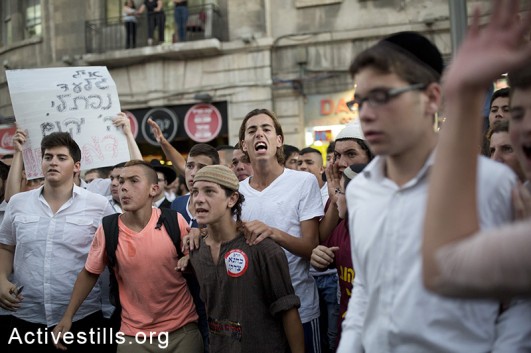
Why is this happening?
There are many explanations. I would like to offer another, less widely-known explanation for this outbreak of racism. In recent years we have witnessed two contradictory trends in relations between Jews and Arabs in Israel: groups that push toward equality and those that work in the opposite direction; groups that work for the creation of a shared society and better relations between Jews and Arabs, and those that work for segregation and worse relations. I have argued in the past that both trends are present in the public, media, bureaucracy and the political arena.
Despite systematic discrimination by the government and profound racism (which of course is nothing new), Arab society in Israel, in cooperation with various factors in Jewish society, including in several government ministries, has been able to effect a significant improvement in its socioeconomic status, to somewhat reduce the inequality, to challenge state institutions and to enjoy substantial and authentic political representation in the Knesset. As Arab society has become stronger in recent years, we have witnessed the first signs of its integration into the centers of power, economy and society in Israel.
We are not talking about some submissive and fawning integration. A generation that did not grow up under military rule has had the courage to bolster its Palestinian national identity, and its bond with the Palestinians in the occupied Palestinian territories and the Arab world. Many prominent representatives of Palestinian communities in Israel, especially in the Knesset and civil society organizations, sharply assert the rights of Israel’s Palestinian citizens, both as individuals and as a collective. They demand equal individual and national rights, and an abolition of the special privileges enjoyed exclusively by Jews.
What’s most relevant in understanding the events of the past month is that Arabs’ increasing strength is not hidden and has not developed only in concealed regions far removed from Jewish life. On the contrary; it has been open and visible and has created further points of daily contact between Jews and Arabs, in diverse arenas.
Note the new Israeli reality of recent years. When I was a child in the 1970s, the only Arabs encountered by Jews who didn’t visit Arab localities were manual laborers. The situation is totally different today. A Jewish citizen who goes into a drugstore will almost always encounter an Arab pharmacist; should he/she need to go to the emergency room they may very well be treated by an Arab doctor. Ten years ago, I managed an algorithm development team in a startup company. At the time, an Arab employee of a hi-tech firm was an exceptional phenomenon. Today we are in the midst of a revolution in which many Arab citizens hold jobs in the hi-tech sector, the jewel in the crown of the Israeli economy. As Odeh Bisharat wrote in Haaretz, “Whoever, back in the 1950s, destined the Arabs to serve as hewers of wood and drawers of water, is now getting them as leaders in hi-tech.”
Jewish university students have Arab lecturers, and sometimes even an Arab department chair or college president. There has already been an Arab minister and an Arab director-general of a government ministry. Perhaps symbolic of the new reality is that not only the common man is exposed to the rising power of Israel’s Palestinian citizens. The chief judge of the panel that convicted the former president of the state, Moshe Katsav, and sentenced him to a long prison term was a Palestinian citizen.
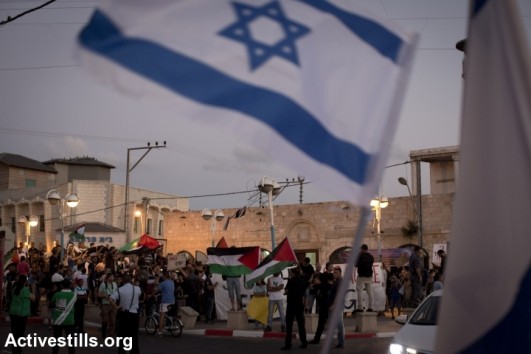
A counter-reaction
As long as Israel’s Palestinian citizens were powerless and excluded, they did not threaten Jewish hegemony. Today, though, Jews are no longer always at the top of every ladder in Israel. This situation undermines the world order of the radical nationalist right, which is terrified by the loss of absolute Jewish hegemony, and is stirred to take countervailing action. In contrast to those on the left and among Palestinian citizens themselves who belittle the economic and social integration of Arabs, it may well be that it is those on the right who have accurately identified the latent potential and consequently see it as a real threat. They are gearing up for a battle to halt what they view as a dangerous process and endeavoring to reduce the rights enjoyed by Arabs.
This a reaction to the fact that Arabs are a much greater presence in our lives than those who would preserve the Jewish hegemony can stomach. The lawsuits against the state, the stronger representation in higher education and the job market, the presence of Arabic language in public spaces (quite simply because there are now more Arabs in shopping malls, universities, workplaces, and so on) – all of these factors amplify the sense of threat, and spawn a desire to make Arab citizens disappear, or at least to push them as far down the socio-economic ladder as possible.
In recent years this reaction has been fueled by right-wing politicians. Avigdor Lieberman, supported by his cohorts in other parties in the current and past government coalitions, has sponsored an unprecedented wave of legislation targeting Palestinian citizens. With the support of the prime minister, the electoral threshold was raised – a brutal step with the potential to banish Palestinian citizens from the political system. And then, of course, there is the ultimate solution: Lieberman’s proposal to strip hundreds of thousands of Israel-Arabs of their citizenship by transferring their home districts to a future Palestinian state. Right-wing leaders have sent clear and unmistakable message to Palestinian citizens of Israel: If you don’t shut up you’ll come to a bitter end.
But despite the great damage caused by these politicians’ assault on Arab citizens, Arab society has not surrendered to the evil wind blowing from the Knesset. They have been joined by Jewish advocates for equality who continue to employ effective strategies to promote equality and full integration into Israeli society and the economy.
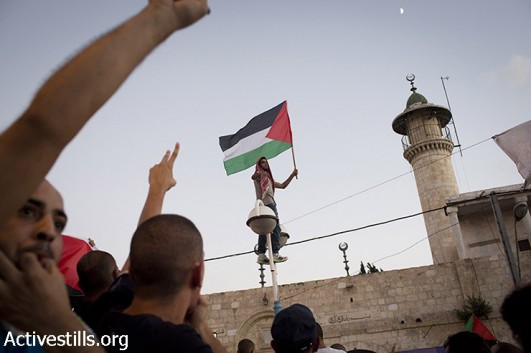
So what has happened in these last two months?
The new phenomenon of the last two months is that the populist, nationalist, radical right has been stirred to action. What its representatives in the Knesset proved unable to achieve, it is now trying to do on its own. Under the cover of its political leaders’ silence or with their encouragement, it has unleashed an assault on Palestinian citizens in order to force them to bow their heads, quite literally. It is simply unable to countenance Palestinian citizens’ increased power, especially not their greater visibility in public spaces.
If Arabs were employed only in cleaning and agriculture, and submissively shuttled home to their towns and villages every evening, Knesset members on the right – now joined by the rightists in street – would not make an effort to expel them from the labor force, political arena and public spaces. Note that most of the incidents of the past months occurred in places that are shared by Jews and Arabs – the mixed towns and the integrated commercial centers and employment zones in Jewish towns. Hair-raising nightly marches that feature cries of “Death to the Arabs!” took place in Upper Nazareth. Arabs were attacked not in their own localities, but on shared public buses and in the streets of mixed cities.
Of course, the strongest reaction was to the strongest trend: Arabs integration into the labor market. For the first time, we are witnessing an unprecedented and systematic attempt by members of the radical right to encourage the dismissal of Arab workers. The more senior an Arab’s position, the stronger the demand that he be axed. I doubt that the right-wing hooligan gangs would be motivated to invest significant energy in demanding the firing of an Arab cleaner. But when it comes to encouraging the dismissal of Arab physicians and pharmacists, professionals in the service of local authorities, shift managers, salespersons and service providers, right-wing gangs will work with all their might.
They simply find it impossible to endure a Palestinian citizen in a senior position, one who inverts the only power relation that the racists want to see between Jews and Arabs: Jews at the top and Palestinians at the bottom. For a racist, it is unacceptable that a Jew might have to depend on an Arab (as a physician, pharmacist or service rep). Here another factor enters and explains why this outburst happened precisely now. That same racist was willing to ‘endure’ the situation as long as the Israeli-Arab kept his mouth shut and did not speak out against the government or against that most sacred institution of all: the army.
And now we have to speak the truth, even if it is unpleasant for so many Jewish readers. In all of the violent conflicts of Israel against the Palestinians or the Arab world, a majority of the country’s Arab citizens, quite naturally, identified with the members of their own Palestinian people and not with IDF soldiers who were fighting against it. Although some Jews knew or intuited this, on some level or another Palestinian citizens’ identification with those the IDF was firing at was not an overt presence in shared spaces. Arab workers were careful not to express their views when in the company of Jewish colleagues.
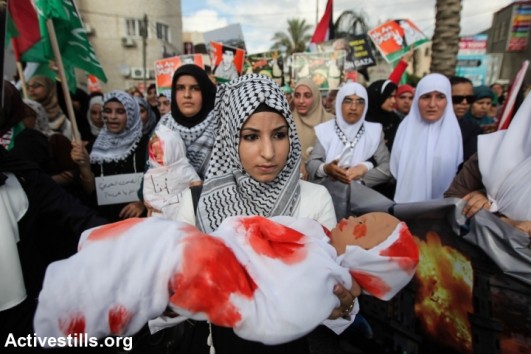
What changed the rules?
But today, in July 2014, the appalling number of Palestinians killed in Gaza (more than 1,800, including 400 children) and the existence of social networks have totally altered the picture. For the first time since the deep penetration of social networks, the IDF is killing many Palestinians and the pictures of dead children show up on Palestinian citizens’ smartphone screens almost immediately. It is inhuman to expect them to support those who are conducting the killing of their people.
Social media has also made it possible that almost every citizen’s opinion of the war, be they Jewish or Palestinian, is exposed for all to see. What Palestinian citizens could once keep within the confines of family and friends has now become known to all. The situation was not symmetrical in the past. Arabs always knew what their Jewish colleagues or customers were thinking, because they heard them saying that it was necessary “to crush the intifada,” “to route out Hezbollah,” “to flatten Gaza so as to teach Hamas a lesson,” etc. They listened, and for the most part kept silent. But during the last month of violence in Gaza, when the atrocities crowded their Facebook pages, along with denunciations of the IDF and its soldiers, they “liked” posts and perhaps even shared them and added a few words of their own. What used to be hidden is now exposed to the world. What the right wing views as Palestinian citizens’ disloyalty to the state, the IDF and its soldiers – and, worst of all, hope for the enemy’s victory – is now public knowledge.
And it is precisely here that the anti-Arab radical right lost it once and for all. The Kahanist hooligans in the street may have remained mute and helpless in the face of growing Arab economic power; but it cannot abide both their increased strength and their hostility to the IDF and the national narrative; all the more so when soldiers are dying. So it goes on the war path. It calls on the government to go all the way and kill Palestinians in Gaza in order to crush Hamas, while it goes to war itself against the Palestinians at home – the Palestinian citizens on our streets.
The same social network that made it possible to learn that one’s Palestinian colleague or pharmacist was not praying for an IDF victory (to put it mildly) enabled the radical right to organize quickly and effectively against Palestinian citizens and to demand their banishment from shared public space. In the best case, the demand targets those who were found not to be falling in line with the national narrative; very soon, however, as happens with every racist movement, the pressure grows into a call to throw them all out (such as the demand that the Rami Levy supermarket chain fire all its Arab workers).
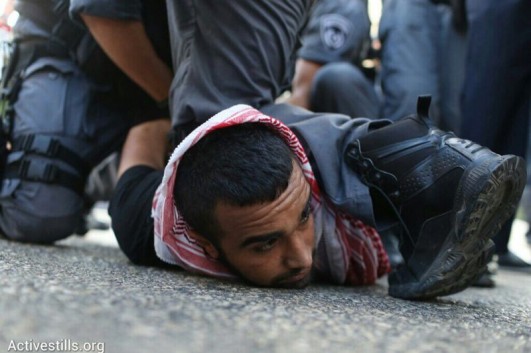
The Knesset and the street join forces for a common cause
It is important for me to note that I am focusing on Jewish society’s responsibility for the deterioration in relations; however Arab society, too, bears some responsibility, although much less. Rocks were thrown at Jewish vehicles in the last month in a few places. It is important to mention that some of the statements against the state by Arab political leaders, although legitimate, critically impair the ability of those of us in a Jewish society who wish to promote equality and to recruit support for our efforts.
In a democratic state, one is permitted to argue that the basic ideology of the majority group – Zionism, in the Israeli case – is colonialist and racist. Personally, I object to these arguments, but they are certainly permissible. But it is not reasonable to expect that such charges will spur the Jewish majority to join the struggle for the rights of the Arab minority. The dismissals of Arab workers during the war were unacceptable; but Arab employees’ displays of joy at the death of soldiers, when they work with Jewish colleagues, is atrocious behavior, and certainly does not promote shared life between Jews and Arabs.
The summer of 2014 has demonstrated that the internal national conflict between Jewish and Palestinian citizens of Israel, which to date has been a non-violent conflict overshadowed by the occupation and the violent Israeli-Palestinian national conflict, has not been able to maintain the status quo, as bad as it was. Israel launched a military operation and the IDF bombed and shelled Palestinian citizens’ own people – in many cases their relatives – and ignored their familial, emotional, personal and national bonds with the Palestinians of Gaza. The fabric of relations within Israel proved unable to absorb this, and almost collapsed.
Thus three different factors came together this summer: the increased strength of Arab society and the greater presence of Palestinian citizens in shared spaces; the war in Gaza, which left the Arab and Jewish sectors totally polarized; and social media networks, which made all this visible.
And precisely at a time when these three factors were operating, the dangerous link-up between the radical right in the government and the even more radical right on the streets emerged and provided momentum for the escalation. In the past month right-wing politicians, including government ministers, have made unprecedented statements against Palestinian citizens of Israel. They have exploited their identification with the Palestinians under bombardment in Gaza to incite against them and to depict them as supporters of terrorism. The High Arab Follow-Up Committee’s decision to call for a general strike in solidarity with the victims in Gaza was a legitimate and non-violent response. But in response the Israeli foreign minister proposed a boycott of Arab businesses that took part in the strike and to cause a severe blow to the Arab economy.
And here Lieberman and the Kahanist hooligans on the streets complement one another. While some burst into a neighborhood pharmacy and demand that the Arab woman behind the counter be fired; Liberman operates on a much grander scale and seeks to expel Arabs from the centers of economic power, or at least to return them to their “natural” role as manual laborers. For years politicians have been trying to expel several Arab parliamentarians from the Knesset; this year, for the first time, they registered a partial success. Meanwhile, their supporters in the street are trying to have the voters who elected these MKs fired from their jobs. The process is not preplanned and coordinated, but it is a combined operation in which both elements – the Kahanists in the street and some politicians of the radical right – are inciting and working in tandem, in different arenas, in pursuit of the same goal. This collaboration makes the situation even worse by making it much harder to curb. The assault against Palestinian citizens is taking place in the Knesset, in the government, on social networks, in the media and, of course, also on the streets.
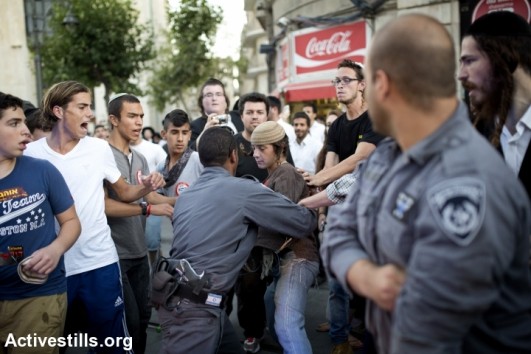
Where do we go from here?
About a month ago I wrote: “I have not given up hope. I still believe that there can be a better future for the relationship between Arab and Jewish citizens of Israel.” I added that history has proven that “ethnic conflicts far more intransigent and violent than this one have been resolved, while conflicts that seemed mild have declined into bloodshed. All options are on the table.”
Today the situation is much more ominous. The optimistic scenario is that this period will be seen in retrospect as the extreme right wing’s rearguard action, its last hoorah before the failure of its campaign against the establishment of a shared and equal society in Israel. Much more horrendous scenarios are possible, of course: the expulsion of the Arab minority from the Israeli economy and society, or harsher discrimination. It is even possible that the Arab sector may revolt against absorbing the blows and resort to a fierce counter-reaction, which, heaven forbid, would trigger a violent battle between Jews and Arabs in Israel. I do not think this scenario is likely, but it can no longer be dismissed as wholly unthinkable.
The harsh news for all of us who are working to create a shared and equal society is that our past successes – the strengthening of Arab society and the creation of shared spaces –are precisely what encouraged the counter-reaction. Even if, by means of a supreme effort, we are able to prevent deterioration in the coming years and manage to promote Arab participation in the centers of social and economic power in Israel, the radical right will mobilize all its forces to try to halt this process. We will have to continue to build a shared society, but now we will also have to prepare for the reaction. In addition to our investment in building, we will also have to invest in preparing our response to this counterattack.
If we, Jewish and Arab citizens who seek a better and shared future in this land, choose life, we have no alternative: We must prepare ourselves for a difficult and protracted struggle. It is in our hands. No one else will do it for us.
Ron Gerlitz (ron@sikkuy.org.il) is the co-executive director of Sikkuy, the Association for the Advancement of Civic Equality.
Related:
For Palestinians in Jerusalem, to strike or not to strike?
Not just escalation: A frightening new era of Jewish-Arab relations in Israel
The Israeli media’s hit job on MK Haneen Zoabi
